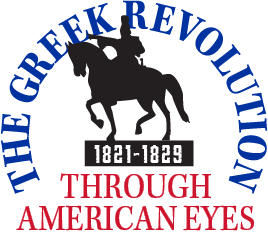III. “Greek Fire” The Grass Roots Response A. Expression of Public Support for the Greek Cause
A15. An Appeal by the People of the City of New York.
Niles' Weekly Register, December 13, 1824
THE GREEKS. The people of the city of New York are fully in earnest to do something handsome for the assistance of the Greeks. At a late meeting of the committee of the Greek fund, William Bayard, chairman, and Charles King, secretary, a letter was presented from N. Biddle, of Philadelphia, containing 300 dollars, for the good of the cause-various other donations have been received; it is recommended that collections should be made in the churches, and expected that it will become even quite fashionable to assist the descendants of those who were the bulwark of light and knowledge in old times, in rescuing themselves from the dominion of a barbarian race. A large and most respectable committee has been appointed to receive donations, &c.; and, if we all give a little, a great good to our fellow men may be accomplished or, if the Greeks should fail, we shall have the consolation to know that we were not indifferent spectators of their glorious struggle for freedom.
Just after the meeting was organized, the venerable col. Willett entered the room every body [sic] rose-he advanced slowly to the table, and spoke in substance as follows:-
I ask one minute's indulgence. I take it for granted that fourscore and three years present a good apology for my not being able to attend the business of this committee. Its object is, if I understand it, the defence [sic] of liberty-it is fifty eight years since I first engaged with the sons of liberty to take measures to oppose British aggression in this country-the sons of liberty were then not divided-they united for the good of their country. I would that it might be so at this day. Our success was not complete at that time, we only got a reprieve, and succeeding oppressions drove us again to assert our rights, to tax ourselves and regulate our own affairs, and we entered into a non-importation agreement. I was of that committee, and, from that day to this, I think my conscience will acquit me in saying, I have long been engaged in the cause of liberty. I am now too old to be active, but I wish it as well as in my more youthful days, and can only, in reference to the objects of this committee, say with regret, “Oh! the day when I was young.” Gentlemen, I could not omit, on this occasion, to say this much, and I have presented myself here to declare, that though age has enfeebled my limbs, my heart yet glows in the cause of which I understand you to be engaged-the cause of liberty.
It may be imagined that this address was received with no little applause–and as the venerable warrior withdrew, the whole committee rose to salute him.
I would rather have had col. Willett's feelings on this occasion, than those of the “restored” king of France after he has eaten an hundred oysters, which is said to be the most notable thing that he can do-and yet I like oysters as well, and as plentifully par, take of them too, as “his majesty"-if I please; with a yankee notion, also, that I eat better ones than enslaved France furnishes him with.
Meetings are called or have been held at Philadelphia and other places, to raise funds for the assistance of the Greeks.
(Hatzidimitriou 166-167)
Source: Constantine G. Hatzidimitriou, Founded on Freedom and Virtue: Documents Illustrating the Impact in the United States of the Greek War of Independence, 1821-1829 (New Rochelle, New York: Aristide D. Caratzas, 2002).
